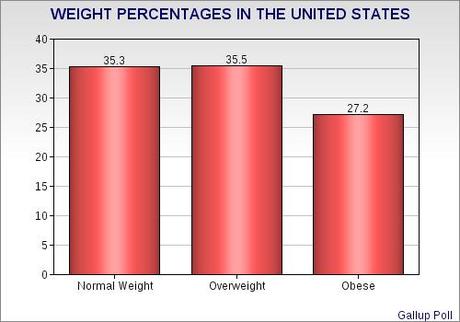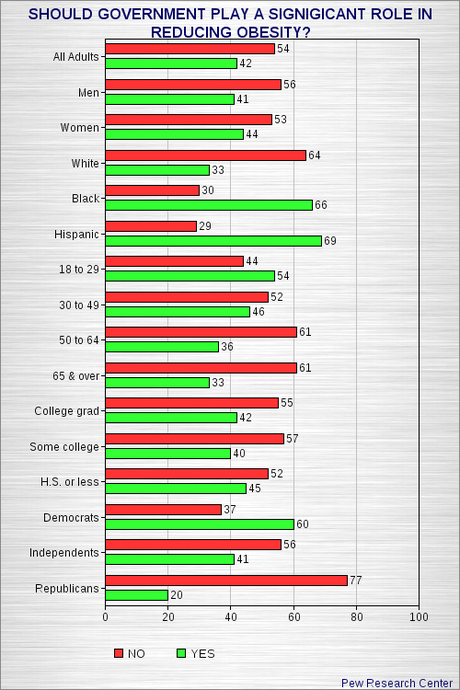 A recent Gallup Poll showed that obesity is a significant problem in the United States, and it is a growing problem. More than a quarter of the adult American population is obese (27.2%), and the percentage of those who are obese has climbed by a full point in the last year (a significant amount considering the enormous size of the poll's respondents). In addition, another 35.5% of Americans are overweight -- leaving only slightly more than a third of the population in the normal weight range (35.3%).
A recent Gallup Poll showed that obesity is a significant problem in the United States, and it is a growing problem. More than a quarter of the adult American population is obese (27.2%), and the percentage of those who are obese has climbed by a full point in the last year (a significant amount considering the enormous size of the poll's respondents). In addition, another 35.5% of Americans are overweight -- leaving only slightly more than a third of the population in the normal weight range (35.3%).And a recent Pew Research Center survey shows that 69% of the country's population recognizes obesity as a serious health problem. The question is -- what should be done about that problem? Is it a proper function of government to regulate what goes into the food offered by retailers and consumed by the public, or is that a choice that should be left up to the individual consumer? The Pew Research Center asked that question, and the answers are in the chart below:
 It turns out that a majority of Americans don't believe the government should play a significant role in reducing obesity in the country. There is a 12 point gap -- with those who think government should not play a significant role at 54%, while 42% believe government should have a significant role. When it is broken down demographically, there are four groups supporting government action -- Democrats (60%), Blacks (66%), Hispanics (69%), and young people (54%). All other groups oppose any significant role by government.
It turns out that a majority of Americans don't believe the government should play a significant role in reducing obesity in the country. There is a 12 point gap -- with those who think government should not play a significant role at 54%, while 42% believe government should have a significant role. When it is broken down demographically, there are four groups supporting government action -- Democrats (60%), Blacks (66%), Hispanics (69%), and young people (54%). All other groups oppose any significant role by government.This does not mean the the majority of Americans think the government should have no role at all. Their are some measures by government that does have the majority support of the public. Consider the following:
Should government require chain restaurants to list calorie counts?
Yes...............67%
No...............31%
Should TV ads of unhealthy foods be banned during children's programs?
Yes...............55%
No...............43%
Should restaurants be prohibited from using trans fats in their food?
Yes...............44%
No...............52%
Should taxes be raised on sugary soft drinks and unhealthy foods?
Yes...............35%
No...............64%
Should the size of soft drinks be limited in restaurants and convenience stores?
Yes...............31%
No...............67%
Frankly, I find myself agreeing with the majority on all of the above questions. I have no problem with the government requiring food companies and restaurants to provide more information about the food they want to sell the public. Information is an important factor in a democracy, and more information being available just helps consumers to make their own decisions. And I wouldn't have a problem with all food advertisements being banned from children's programming, since most children simply do not yet have enough knowledge to choose what is either good or bad for their health.
But I don't like it when the government goes further, and bans or taxes certain food choices. In a free country, citizens should be allowed to make their own choices -- even if those choices may not be good ones (and may even negatively affect their health or happiness). The only choices a person should be restricted from making are those that hurt other people.
I'm also not sure than government bans will work very well to reduce obesity anyway. I think most people who are overweight or obese are that way because they eat too much -- not because of what they eat. Eating a moderate amount of fast food may actually be healthier than eating far too much of a food considered to be healthy.
So, I say the government should have a role in reducing obesity -- but that role should be limited to providing information. It should not ban or tax foods that are believed to be unhealthy. That should be a choice reserved for the individual in a free country.
What do you think?
----------------------------------------
The Gallup Poll was done between January 1st and October 28th of 141,935 nationwide adults, and has a margin of error of only 0.5 points.
The Pew Research Center survey was done between October 30th and November 6th of 2,003 nationwide adults, and has a margin of error of 2.5 points.

